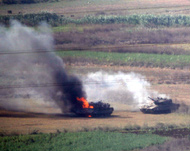Diplomacy intensifies as Beirut hit
Israeli warplanes have struck the southern suburbs of Beirut while diplomatic efforts to end the month-old Israel-Hezbollah war intensify with a surprise visit from the US Middle East envoy.

Israeli fighter-bombers carried out 12 attacks on Beirut’s near-deserted southern suburbs at dawn on Friday, strongholds of the Shia faction, according to Lebanese police who were not able to immediately say what had been targeted.
At least 20 explosions reverberated in central Beirut as thick black smoke rose from the suburb of Dahiyeh, a Hezbollah stronghold already devastated from previous Israeli attacks.
Aljazeera’s correspondent said Israeli warplanes also staged seven air strikes near al-Najariya in al-Zahrani district in southern Lebanon.
The Israeli raids brought down three buildings at a major crossroads, blocking all traffic on the area’s main thoroughfare, Hadi Nasrallah, named after the slain son of Hezbollah leader Hassan Nasrallah, an AFP photographer said.
Another raid caused the collapse of a second building that also blocked the old route to the airport and hit a building belonging to the highest authority of Lebanon’s Shia community.
Israel dropped new leaflets on Beirut on Friday morning in a bid to undercut support for Hezbollah by saying that its losses were far greater than admitted by the group.
In another incident, one person was killed on Friday in an Israeli air strike on a vehicle in Muqnah town in north Bekaa, Aljazeera said.
Hezbollah’s response
For their part, Hezbollah fighters resumed their cross-border rocket attacks on Israel on Friday, hitting the northern port city of Haifa and several locations in western Galilee, Aljazeera’s correspondent said.
The rocket attacks lightly wounded at least two people in Haifa, the Magen David Adom ambulance service said.
In a statement, Hezbollah said its fighters killed or wounded about 15 Israeli soldiers trying to advance towards the border village of Aita al-Shaab. “The remaining soldiers retreated under the cover of artillery shelling,” the statement read.
 |
|
An Israeli tank burns after being |
Aita al-Shaab is one of several Lebanese border towns where gun battles have been raging for weeks between Israeli soldiers and Hezbollah fighters.
Hezbollah said its men inflicted casualties on Israeli forces in the village of Rachaf as well, about 14km from the Israeli border.
In northern Lebanon, 11 civilians were killed and nine wounded in a further strike by Israeli warplanes on a bridge, hospital sources said.
Israel also struck an area close to the Lebanese border crossing at Masnaa in the Bekaa Valley, about 50km southeast of Beirut, but there were no reports of casualties.
Israeli fighter bombers shot missiles at the bridge in the Akkar plain, near the border with Syria, and returned for a second strike when residents had gone onto the bridge to inspect the damage. The wounded were taken to three hospitals in Akkar.
Ground thrust
Israeli tanks, meanwhile, thrust into southern Lebanon, massing around several villages amid fighting with Hezbollah fighters, even as the Israeli government insisted its expanded ground offensive had yet to begin.
Intensive shelling, bombardment, rocket-firing and ground exchanges were reported in the general areas of Khiam, Qulayha, Buj al-Maluke and Marjayoun, including the inhabited areas, during the night and this morning,” the UN force stationed in south Lebanon said.
 |
|
Hezbollah strongholds have been |
On the diplomatic front, Philippe Douste-Blazy, the French foreign minister, will leave on Friday for the UN headquarters in New York to try to secure an agreement on a resolution on the conflict.
David Welch, the US Middle East envoy, was holding talks in Beirut with Fuad Siniora, the Lebanese prime minister, on the UN resolution, after arriving on a surprise visit.
Israel said on Friday that most of its demands would be satisfied if the resolution drafted by France and the US was adopted by the UN Security Council.
Haim Ramon, the justice minister, told public radio: “We are attaining the main goal we had set ourselves, which is to remove the threat of rockets on northern Israel.
“Hezbollah will no longer be deployed south of the Litani river and thousands of soldiers from an international force will be there to ensure it.”
Russian resolution
France and the US have been wrangling for several days over the wording of a text. Paris wants a resolution to incorporate Lebanese demands that Israeli soldiers must leave Lebanon as soon as fighting stops.
At the UN headquarters in New York, Russia lost patience and presented its own draft resolution calling for a 72-hour humanitarian truce.
But Dan Gillerman, Israel’s UN ambassador, said on Friday that he met Vitaly Churkin, Russia’s UN ambassador, to “explain that a ceasefire of this type would serve only one purpose, to allow Hezbollah to regroup and recover”.
“We think this is a bad idea,” Gillerman, speaking from New York, told Israel Radio.